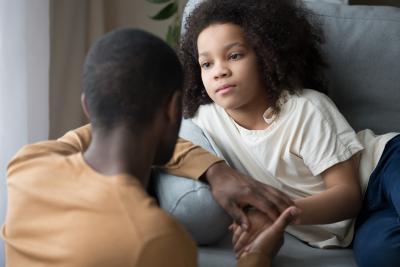Talking with Kids About News and Traumatic Events

Following any upsetting news or traumatic event, parents and caregivers may struggle with how to best support and talk with their children, while also managing their own emotions. It can be difficult to prevent children from seeing news through TV and online media or hearing and talking about things at school; however it is recommended that limiting exposure can be helpful for the mental health of our children. Feelings of anxiety and sadness, or changes in sleep and appetite are some of the reactions that children may experience.
Here are some resources (below) for families to help have conversations and cope with traumatic news and events.
*If your child is showing signs of extreme anxiety or depression, call us to make an appointment with your provider.
National Child Traumatic Stress Network
Talking to Children About the Shooting
Coping After Mass Violence
Age-related Reactions to a Traumatic Event
Parent Guidelines for Helping Youth After Mass Violence
Psychological First Aid for Schools
Child Mind Institute
Anxiety Over School Shootings
Going Back to School After a Tragedy
Sesame Street in Communities
Community & Gun Violence
Traumatic Experiences
National Public Radio (NPR)
How Gun Violence Affects American Children
What to Say to Kids When the News is Scary
Book for Young Children from Piplo Productions (free PDF version)
Once I Was Very Very Scared
National Association of School Psychologists
Talking to Children about Violence: Tips for Parents and Teachers
PBS
Helping Kids Navigate Scary News Stories
American Academy of Pediatrics, Healthy Children
Talking to Children About Tragedies and Other News Events
How to Support Your Child's Resilience in a Time of Crisis
Childhood Exposure to Violence
American Academy of Child and Adolescent Psychiatry
Disaster and Trauma Resource Center
Resources compiled by Maryland Behavioral Health Integration in Pediatric Primary Care (BHIPP).

